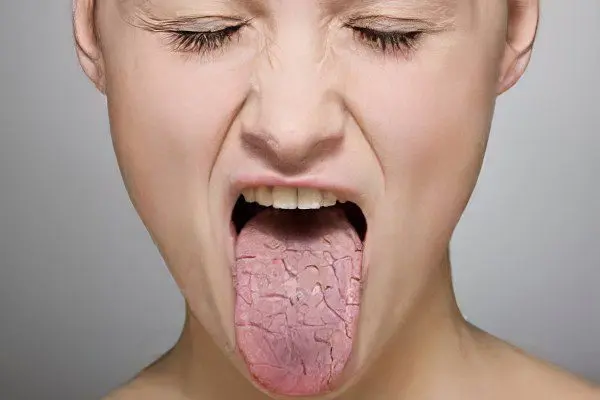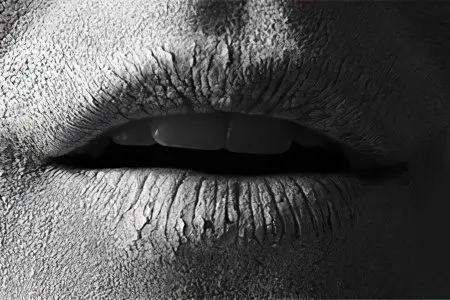Contents
One of the most common complaints in many diseases is dry mouth. These can be diseases of the digestive system, acute pathology of the celiac organs requiring surgical treatment, diseases of the heart and nervous system, metabolic and endocrine disorders, and diabetes mellitus. Detailing and correct interpretation of this symptom can become one of the main diagnostic criteria, suggesting the correct diagnosis.
Causes of dry mouth

There are more than enough reasons for dry mouth. Normal hydration of the oral mucosa with saliva depends on many factors. Globally, the appearance of a sensation of dry mouth can be caused either by a qualitative and quantitative violation of the composition of saliva, or by a disturbed perception of its presence in the oral cavity. The central mechanisms for the development of dry mouth can be:
Local changes in sensitive receptors in the oral cavity;
Violation of trophic processes in the oral mucosa;
Violations of water metabolism and electrolyte balance in the body;
Increased osmotic pressure of the blood;
Impact on the body of toxic substances from the environment and internal intoxication;
Violations of the nervous and humoral regulation of saliva production;
Mechanical overdrying of the mucous membrane with air;
Possible diseases in which there is dry mouth:
Diabetes. Usually, dry mouth that first appears, which is persistent, is a sign of this disease. If it is combined with excessive urine output per day, then the diagnosis becomes obvious, even without additional examinations;
Prolonged exposure to high temperatures or sleeping with an open mouth, when there is an elementary drying of the oral mucosa in the morning;
taking medications (antibiotics, drugs for the treatment of hypertension, and others);
Dehydration of the body (prolonged vomiting, diarrhea, insufficient water intake);
Diseases of the oral cavity;
Diseases of the brain and nervous system, when the normal regulation of saliva secretion is disturbed (strokes, circulatory disorders, Parkinson’s and Alzheimer’s disease, trigeminal neuritis);
Alcoholic and other types of external intoxication;
Tobacco abuse;
Diseases of the digestive system (gastritis, peptic ulcer, hepatitis, pancreatitis, etc.);
Acute purulent diseases and infections;
Acute surgical pathology of the abdominal organs (appendicitis, cholecystitis, perforated ulcer, intestinal obstruction).
If diabetes is not confirmed, further diagnostic work can be done by detailing the dry mouth and its combination with other symptoms.
Dry mouth in the morning
There are situations in which dry mouth appears only in the morning. This, as a rule, indicates problems associated with local causes or is a natural manifestation of external influences on the body. Dry mouth in the morning goes away on its own some time after waking up. After all, the main mechanism of its appearance is mechanical overdrying by air during sleep when breathing through the mouth (snoring, problems with nasal breathing). Almost always, after drinking alcoholic beverages, dry mouth appears in the morning.
Dry mouth at night
Nighttime dry mouth requires more precise detail, since the causes of its occurrence are more serious than in the morning. It can be like a banal drying of the mucous membrane in the air or overeating at night, or diseases of the nervous system. At night, the secretion of saliva decreases in each person, and with impaired innervation of the salivary glands, this process is even more impaired. Sometimes constant night dryness in the mouth is evidence of chronic diseases of the internal organs.
Other symptoms of dry mouth

It is unacceptable to consider only one dry mouth. Be sure to pay attention to other symptoms that may accompany it. The correct interpretation of the combination of symptoms with dry mouth helps in determining the true cause of their occurrence.
Weakness
If dry mouth is accompanied by general weakness, then one thing can be said: the causes of its origin are definitely of a serious origin. This is especially true with their constant progression. Such patients must be comprehensively examined. Indeed, in the end, even the most dangerous diseases can be detected at the initial stage of their development, which will serve as a good prerequisite for their treatment.
Weakness, combined with dry mouth, occurs with diseases of the central and peripheral nervous system, intoxication of external origin, toxicosis of cancerous and purulent origin. In the same way, infectious and viral diseases, diseases of the blood system (anemia, leukemia, lymphoma) can manifest themselves. Cancer patients may also experience weakness associated with dry mouth after aggressive chemotherapy or surgery.
white tongue
They say about the language like this – it is a mirror of the abdominal cavity. Indeed, by the nature of the plaque on the tongue, you can learn a lot about the digestive system. Usually these changes are combined with dry mouth. A similar combination of symptoms may be evidence of diseases of the esophagus, stomach and intestines. These include: gastritis and gastroduodenitis, gastroesophageal reflux disease and reflux esophagitis, peptic ulcer of the stomach and duodenum, colitis and enterocolitis.
If severe pain in the abdomen is combined with dry mouth and a white coating on the tongue, this is a sure sign of a catastrophe in the abdomen. Such diseases include appendicitis and its complications, simple and stone cholecystitis, pancreatitis and pancreatic necrosis, intestinal obstruction and perforated gastric (duodenal) ulcer. In such situations, do not expect improvement. Treatment should be urgent and may require surgery.
Bitterness in the mouth

Two mechanisms may be responsible for the origin of bitterness in the mouth, combined with dryness. The first, associated with disruption of the biliary system, the second, with dysfunction of the stomach in terms of secretion and evacuation of gastric juice and hydrochloric acid. In both of these situations, either bile or acidic foods are retained. The result of such stagnation is the absorption of their decay products into the blood, which affects the qualitative and quantitative characteristics of saliva. Bitter components are also deposited directly in the mucous membranes. The causative diseases can be acute and chronic cholecystitis, dyskinesia of the biliary system with stagnation of bile, chronic viral and toxic hepatitis, peptic ulcer and gastritis, chronic diseases of the pancreas that cause a violation of the outflow of bile.
Nausea
The combination of dry mouth with nausea is not uncommon. Common causes of their combination are intestinal infections and food poisoning. They can occur even before the appearance of a detailed clinical picture in the form of diarrhea and vomiting. Sometimes dry mouth with nausea occurs due to the usual errors in diet or overeating.
It is impossible to unequivocally regard such a combination of complaints. Additional symptoms in the form of abdominal pain, stool and digestion disorders must also be evaluated. Probably only one thing can be said – the combination of nausea with dry mouth is evidence of problems with the digestive system.
Dizziness

If dizziness joins dry mouth, this is always an alarm signal. After all, he talks about the involvement of the brain in the process and the disruption of automatic mechanisms for regulating its blood supply. This is possible either with primary diseases of the brain, accompanied by dry mouth and dizziness, or with any other diseases that caused dehydration or intoxication.
In the first case, the appearance of an alarming combination of symptoms occurs as a result of a direct disruption of the brain, and as a result, the inability to keep the body in an upright position. This disrupts the process of normal salivation, which is manifested by dry mouth. Secondary changes in the body, not related to the brain, occur when the volume of circulating blood decreases, as a result of which its blood supply decreases. In this case, those pathological processes occur that are characteristic of the primary brain lesion.
Frequent urination
Dry mouth and frequent urination make you think of two problems. In the first case, we are talking about kidney disease. Chronic inflammatory lesions of these organs are directly related to the water balance in the body, determining the feeling of thirst and the amount of daily urine. In the second case, we are talking about diabetes.
The mechanism of the combination of symptoms of dry mouth with frequent urination can be explained as follows. An increase in glycemia (the amount of sugar in the blood) leads to an increase in the osmotic pressure of the blood. As a result, the constant attraction of fluid from the cells into the vascular bed. An increase in the volume of fluid in the blood causes a feeling of thirst and dryness of the mucous membranes, while simultaneously causing the kidneys to remove excess fluid from the body.
Dry mouth during pregnancy
The normal course of pregnancy is rarely accompanied by painful symptoms. During this period, pregnant women may experience any complaints, but they are all temporary, without disturbing the general condition of the woman. Periodic dry mouth during pregnancy is no exception. But, if this symptom acquires a protracted and progressive course, it is always an alarm. It can signal malnutrition and water regime of the pregnant woman, exacerbation of any existing chronic pathology.
But you need to be afraid not so much of these conditions as of threatening toxicosis. If it occurs in the first half of pregnancy, it is not so scary. But late toxicosis (preeclampsia) always causes fear for the life of the mother and her baby. Therefore, every pregnant woman must know that dry mouth, combined with nausea, vomiting, swelling and increased blood pressure, is the first call of preeclampsia. It is not worth waiting for self-improvement. Be sure to seek medical help at the antenatal clinic.









